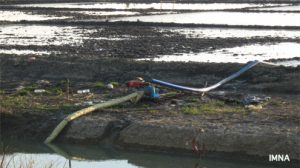
Taw Lawi
: Farmers have decided not to plant their annual summer rice paddies this year.Hnee Done villagers from Kyaikmayaw Township, Mon State said that the summer paddy will cost more without receiving a better price on their product. Their paddy field can be confiscated by the Burmese government if it is not used, but the farmers receive little profit when they plant rice. Every year they plant rice and they lose money, so this year farmers have explained they will plant beans instead.
“The summer paddy costs 150,000 kyat per acre, and it costs more in areas that are further away from water supplies. We would make a profit if we could plant with more fertilizer. If the authorities force us to plant in this field, we will substitute rice for beans instead,” one Nidon farmer said.
The most rice that farmers are able to produce during the summer is around 80 baskets per acre and they will receive around 240,000 kyat or 300,000 kyat for 100 baskets. Farmers will receive a profit of only 50,000 kyat per acre. On the other hand, the cost for cultivating beans is about 80,000 kyat per acre and they will receive 150,000 kyat per acre during production, explained a bean cultivator from Nyaing Pin Seik village, Kyaikmayaw Township.
Water, fertilizer, and fuel are the most important necessities for cultivating the summer rice paddies, and half of the cost is spent on fuel for the machines used to irrigate the fields.
According to a civilian staff member from the Myanmar Agricultural Service (MAS) in Moulmein District, the Burmese government mandates that the farmers plant rice in these areas, the farmers are also made to buy fuel individually from private shops because the MAS Myanmar Petroleum shops have not distributed fuel to the farmers.
This MAS staff member explained, “MAS will not distribute fertilizer to the farmers this summer, though Mon State Peace and Development Council (SPDC) has sold natural fertilizers to the farmers.”
One paddy farmer from Mekayo village, Kyaikmayaw Township explained, “The Mon SPDC sold fertilizer and diesel last year, but we didn’t get all we needed. Also, the price for fuel wasn’t appropriate for the profit we would receive on cultivation. We made very little off of our paddies, so we don’t want to plant rice again.”
MAS sold fertilizer to the farmers until 2003 when the Burmese Regional Commanders ordered the Township Peace and Development Council to sell to the farmers instead, reported a retired civilian staff member.
According to the MAS District department, the entire Moulmein District plans to cultivate about 80,060 acre: 55,600 acre at Kyaikmayaw; 11,550 at Mudon; 8,300 at Ye, 2,500 at Moulmein; 1,750 at Thanphyuzayart; and 360 at Chaung Zone.

